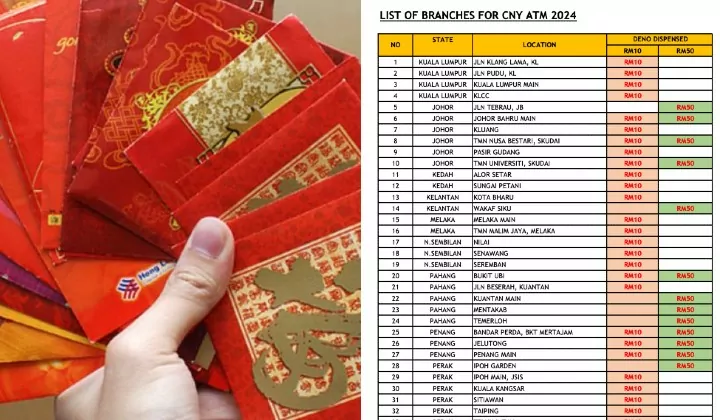Malaysians Navigate New Banknotes Shortage For Ang Pow Tradition
As the festive air fills Malaysia with the onset of Chinese New Year, the tradition of giving anf pow, or red packets, remains a beloved practice.

Subscribe to our FREE Newsletter, or Telegram and WhatsApp channels for the latest stories and updates.
As families prepare for Chinese New Year (CNY) celebrations, the hunt for new banknotes to fill Ang Pao packets has become a test of patience and planning.
With the tradition holding strong as a symbol of prosperity and good luck, banks across Malaysia have seen a surge in demand for crisp RM10 and RM50 notes.
Maybank has responded by offering specially designated ATMs nationwide where customers can withdraw the notes from 2 to 9 February.
This initiative serves the festive needs and promotes sustainability by circulating recycled fit banknotes.
Other banks are expected to join the effort as CNY draws nearer, setting up similar services at select locations.
However, the availability of new notes is not without its challenges.
Maybank has noted that it provides recycled fit banknotes to promote sustainability and save resources.
To facilitate a smoother experience, it is recommended to withdraw cash a few days in advance and check for updated lists of ATMs dispensing new notes on their official websites.
The maximum withdrawal limit is generally set at RM300 to ensure wider availability.
That moment bila ATM machine bg so fresh so clean new ringgit notes. Rasa mcm dpt duit raya dari bank. Syg nk guna 🙁 pic.twitter.com/0FMO54FnPN
— ⭐ Anise (@aniskhalidi) March 10, 2015
Embracing Digital Red Packet
The scarcity of new banknotes this season has highlighted the importance of these traditions and the lengths to which individuals will go to preserve them.
As queues lengthen at ATMs, a sense of community and shared purpose emerges, reflecting the festival’s spirit.
In light of these challenges, some are turning to digital solutions like DuitNow on the MAE app for cashless transfers, offering an alternative to the physical exchange of red packets.
According to an article on RinggitPlus, the Association of Banks in Malaysia (ABM) has been working with Bank Negara Malaysia (BNM) to promote e-angpow via the Go Green campaign over the past few years.
This practice is considered convenient and environmentally friendly, aiming to reduce carbon emissions and conserve resources.
Cultural Significance and Monetary Considerations
Ang pow packets are not merely gifts of money but symbols of good fortune and blessings.
The cultural significance of these red packets transcends the value of the cash inside.
However, there are general guidelines to help givers decide on an amount that is generous and auspicious.
- Relationship to recipient: Close family members receive more than distant relatives or friends’ children.
- Marital status: Traditionally, single individuals, especially children and young adults who are not yet working, are the main recipients of ang pow.
- Financial ability: The giver’s financial situation is an important consideration. Giving within one’s means is customary, ensuring that giving does not become a financial burden.
- Number ‘8’ and avoiding ‘4’: The number eight is considered particularly auspicious in Chinese culture, symbolizing prosperity. Hence, amounts like RM18, RM88, or RM168 are common. Conversely, the number four should be avoided as it sounds like the word for death in Chinese.
Share your thoughts with us on TRP’s Facebook, Twitter, and Instagram.





